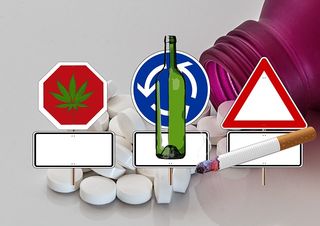Addiction
Your Child and Mind-Altering Substances
A dialogue that may help reduce the risk.
Posted October 30, 2019 Reviewed by Gary Drevitch

Substance abuse is among the most important parenting topics, and among the most ticklish.
Key preventers of abuse are parents’ role modeling and placing the child in schools and activities with friends who are unlikely to be abusers.
But done well, one or more conversations with your child can also help. And with alcohol seen as normative and marijuana increasingly legalized, a first conversation may be needed quite early in your child’s life.
If you sense that your child is already quite aware of mind-altering substances, you might want to initiate the conversation, but often, it’s wise to wait until the child brings it up. That will make it seem less like one of those easy-to-blow-off parent lectures. Worse, you bringing it up risks making the issue top-of-mind, thereby increasing the chances of early use.
Of course, the conversation will vary with the child and on you and your values, but here is a sample dialogue that you may find helpful. In this scenario, parent and a pre-teen or early teenage child are driving on the freeway:
Child: Mom, see all those billboards for cannabis. What’s cannabis?
Parent: It’s another word for marijuana.
Child: Oh, you mean weed. What’s the big deal with weed?
Parent: It’s a drug that makes you feel kind of weird that some people like. But it is quite dangerous, especially for people under 25, because your brain is still forming, so damage can be permanent.
If a child seems to be asking just out of abstract curiosity like the myriad other questions kids are curious about, and if the child will let it drop, it may be best to leave it there: Substance abuse may quickly fade from top-of-mind. But if the child wants to continue the discussion, the subject may not be of mere academic interest. Here’s one way the conversation might continue:
Child: But you and dad drink, and dad drinks a lot.
Parent: He wishes he could stop and he tries, but it can be really hard. That’s true of “weed,” too. All mind-altering substances can hurt your life, really. Teens tend to take risks they wouldn't take if they were older, so if you make a dangerous choice, it may be too late: You may well have gone beyond the curiosity phase to where it actually and permanently lowers your brainpower, your motivation, and your memory, and even increases your risk of a heart attack and schizophrenia. And it becomes very hard to stop. That all makes me scared to think of you doing it.
Child: Mom, that's what they did a long time ago: They exaggerated the dangers of weed to get people not to do it.
Parent: Today, there is good science documenting the dangers.
Child: Mom, I was just asking about the billboards! ... but cool kids are doing it.
The parent has a dilemma here. If he or she ends with “You know I’ll always love you,” it increases the chances of your child coming back to talk with you about such issues but it implies that you think that doing alcohol or drugs is no big deal. Personally, I’d probably end by taking a middle ground:
Parent: I can only say, dear child, that I really hope you don’t even try it. But if you ever want to talk more about it, (in my joking tone) I promise not to beat you up ... for more than a half-hour.
I read this aloud on YouTube.
The most recent installments of this series, Doables: Baby steps to a better life, focus on the K-12 parent’s role.


